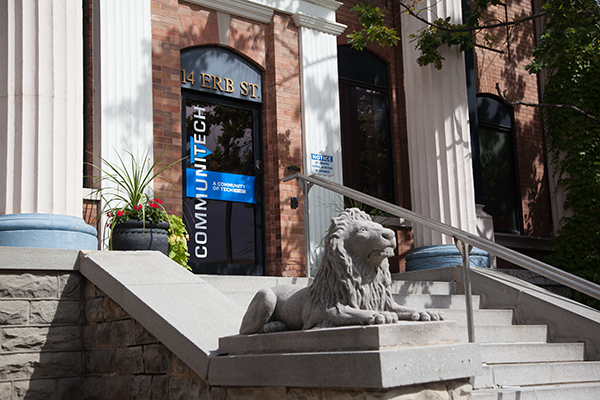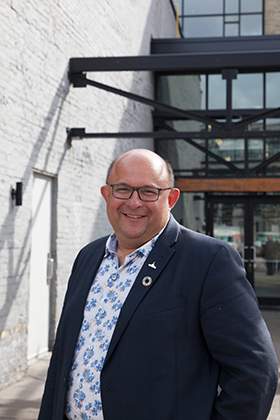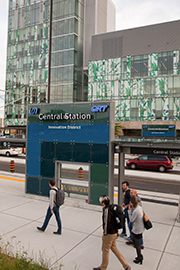How well do you remember 1997?

Jean Chrétien won his second federal election that summer, with Preston Manning’s Reform Party sitting in opposition. Oscar Peterson was awarded his last Grammy, for lifetime achievement in music, and James Cameron’s Titanic flooded the box office. The year’s biggest (and oddest) business story concluded in Indonesia, when Bre-X geologist Michael de Guzman apparently leapt to his death from a helicopter – and dreams of a late-century gold rush ended with him.
Meanwhile in Waterloo, Communitech began.
From the start, the ambition was clear: help a small-but-mighty region of southern Ontario garner mention in the same breath as Silicon Valley.
At the time, Waterloo was already home to Research In Motion and OpenText, both of which were gaining international prestige, with a budding crop of tech entrepreneurs busting out of classrooms and vying to join them.
Communitech would unite these forces and lo, ripples of their success would echo across the Toronto-Waterloo Region Corridor and beyond. If not Silicon Valley North, then the seat of Canadian innovation.
Two decades on, that’s exactly what has happened. The Corridor has earned its place among the world’s leading tech clusters, with a workforce of more than 200,000 spread across 15,000 companies – more than 900 of which were serviced by Communitech last year. At the Corridor's western terminus, civic leaders credit the innovation centre as a key player in everything from upgrades to infrastructure and public transportation to the health of neighbourhood businesses to frequent acts of local philanthropy.
The ripples of Communitech’s local impact have travelled far – and are currently making waves as far east as Ottawa, pushed along by Communitech’s advocacy.
“We have a generation of entrepreneurs that realize innovation can be a driver to improve lives. That’s the story,” Justin Trudeau said this April in Kitchener, during a fireside chat with Michael Litt, Vice-Chair of Communitech’s board and CEO of Vidyard, the video-for-business provider that got started inside the Communitech Hub before striking out on its own, and is now considered one of the Corridor’s brightest lights.
Vidyard adheres to the 1:1:1 pledge for corporate philanthropy, donating one per cent of employee time, one per cent of product and one per cent of profits to local non-profit programs – including a monthly series of social events for charity called Plugin.
“[Michael] changed the direction of this community, and to some extent this country, by saying, ‘F--- you, we can build a kickass technology company better in Kitchener-Waterloo than we can in the Valley,’” Communitech president and CEO Iain Klugman has said of Litt – words that just as well describe his own organization’s works.
“Literally from day one it was a force to be reckoned with.” – Waterloo Mayor Dave Jaworsky
Back in ’97, Communitech’s founders, a group that predates both Klugman’s and Litt’s tenures, were leading their own companies when they came together to represent Waterloo Region’s tech interests. “Out of the gate, to have the strength of a board that’s strictly CEOs is incredibly powerful,” says Dave Jaworsky, the current mayor of Waterloo. “Literally from day one it was a force to be reckoned with.”
Jaworsky spent a quarter century at IBM and BlackBerry – and was a Vice-Chair of Communitech’s board, prior to Litt – before entering politics. (“I might be the only mayor in the world who has a math and computer science degree,” he says with a chuckle.) First in executive suites and now in office, he has long benefited from the local concentration of outstanding STEM faculties.

The Communitech Data Hub in uptown Waterloo opened earlier
this year. (Photo: Simon Willms)
“I have about 10,000 new PhDs, master’s, bachelor and college diploma holders [graduating] each and every year into a city that has a population of 130,000,” he says. “Ever since entrepreneurship became fashionable, they’re creating companies like never before.”
In 2015, Waterloo Region’s GDP was measured at $26.35 billion, or almost $51,000 per person – 15 per cent higher than the provincial average. Innovation is clearly driving the surge: Locally, there were 15.36 patents per 10,000 people, which is more than 11 times higher than the national average.
Communitech’s first four homes were all in the city of Waterloo, although by the time Jaworsky won the mayor’s seat in 2014, it had relocated to its current digs in the Communitech Hub in downtown Kitchener’s landmark Lang Tannery. He wanted them back.
“When I became mayor, I knew one of the first things that I wanted to do is to bring Communitech to my uptown because a strong urban environment has live, work and play,” he says.
Jaworsky got his way this spring, when Communitech launched a new data hub in an old police station in uptown Waterloo. CIBC and IBM have since moved into the building. “You can either bring in companies one by one and hope for the best,” he says, “or you can bring in something like Communitech, which is a catalyst for attracting [more] companies.”
“To see how we've come from that to where we are as a community today, it's kind of mind-blowing.” – Kitchener Mayor Berry Vrbanovic

Kitchener Mayor Berry Vrbanovic
(Photo: Simon Willms)
In Kitchener, Mayor Berry Vrbanovic sounds equally effusive. “Thirty years ago this year I helped install the first PCs in the City of Kitchener as a student working here,” he says. “So to see how we've come from that to where we are as a community today, it's kind of mind-blowing.”
In late 2016 Vrbanovic travelled to Silicon Valley – a business trip he’s made before, alongside other mayors from the Corridor – to support a Vidyard recruiting event. In California, he met an attentive audience that was “very encouraged about the level of support that exists in Ontario, and, quite frankly, from a federal government that's very committed to the technology and innovation agenda.”
He credits some of the current mood in Ottawa to lobbying work that Communitech started two decades ago.
“Being the voice of the tech companies and the innovation sector, [they spoke] to anyone who would listen in the governments of the day, about the fact that we as a country were going to thrive in an era when manufacturing was going offshore...and that our strength was going to be knowledge-based economic drivers,” Vrbanovic explains.
Again, this is basically what’s come to pass since 1997. Jaworsky and Vrbanovic can both rattle off lists of improvements to their city’s economic and cultural conditions. The Prime Minister stopped by for a chat. The Mayor of Toronto even visited Waterloo Region and said nice things about it. Can you believe that?

Grand River Transit’s Central
Station will soon deliver
tech workers to downtown
Kitchener on a new light
rail transit system.
(Photo: Simon Willms)
In case not, just pick a weekday lunch hour and one of the many good restaurants within striking distance of the Communitech Hub at the Tannery. Enter unannounced. If you can get a table, count your blessings. If instead you find yourself waiting, as often happens: Thank innovation, then introduce yourself to the rest of the queue. Chat about the local light rail development, and the prospects for fast trains to Ontario’s capital – Stage 1 of a modern LRT system linking Kitchener, Waterloo and Cambridge is scheduled to begin next year, and Communitech has been among the loudest voices advocating for a high-speed rail corridor to Toronto by 2025. (“I just see a sense of urgency to this,” John Tory, aforementioned mayor of T.O., has said about that.) Ask if your linemates work in tech – with 40-some startups in the neighbourhood, chances are that they do.
“You walk in and our lounge is full and people are joining together because they actually know the person to their left... Groups start to combine, and there’s more of a community feel,” says Trella White, co-owner of Gilt, which opened on King Street West in September 2014. In addition to regular service, the restaurant delivers catered lunches to local tech offices daily, then enjoys a busy dinner service for the after-hours crowd.
“Companies start in Communitech and move out of Communitech when they get to a certain size,” White says. “They typically take office space downtown. They’re really committed to Kitchener, committed to the economy.”

